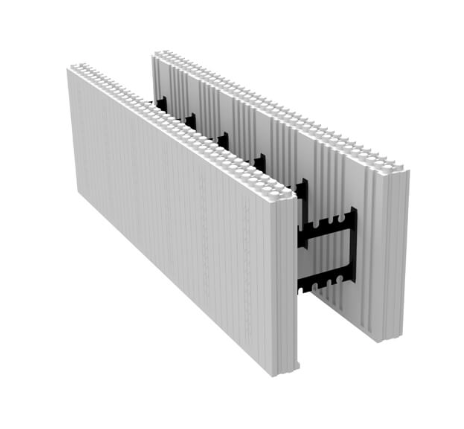This Soundproof Material Blew My Mind!
Oct 02, 2023Recently, a member of our community asked me to make a video about ICF or Insulated Concrete Forms. I had never heard of it and so I did some research. I was pleasantly surprised to see that ICF would be a great building material for soundproof home recording studios. Let me tell you why.
1) Why ICF Is Great For Soundproofing
ICF is a construction technique where concrete is poured into pre-fabricated blocks, kinda like lego blocks. These blocks are made out of styrofoam and are hollow to allow for concrete to be poured in. They are essentially a 6" to 12" concrete wall that is relatively easy to build and offers insulation as well as durability.
So for soundproofing the styrofoam is not that important. What is important is the mass of the concrete itself. According to one ICF producer, LOGIX ICF, you can get blocks in foam to foam dimensions of 4"-12." All budget aside, the 12" blocks would be the best and the 4" blocks the least best.
Below is an image from LOGIC ICF of their block system.

According to Jenkins Design Build, ICF has a consistent STC rating of 54. That is really good for just one wall (Solutions and Technology). Now I would still recommend framing an inside wall with a 1" air gap, but you wouldn't need MLV or Green Glue and you would be fine with the standard two layers of 5/8" drywall. I would imagine drummers, loud bands and most home studio enthusiasts would be blown away by this type of design.
Another benefit to ICF is that the blocks fit together seamlessly and are therefore air tight. This is another benefit to soundproofing and recording studio design.
Lastly, let's look at another source just to understand how soundproof a concrete wall really is. According to the Master Handbook of Acoustics, two 6" concrete walls with 6" air gap will give you an STC rating of 59. That is without fiberglass insulation in the middle, which would increase isolation.
A single 12" concrete wall would give you an STC rating of 51. The air gap and insulation is still a critical part of your soundproof wall system. (Everest, Frederick A., and Ken C. Pohlmann)
As a side note, concrete and brick massive, but do have the drawback of transmitting impulse noise easily. This means if you tapped on your concrete wall with a hammer, the sound would ring clearly on the other side. This is another reason the air gap and double wall system is desirable.
2) Other Benefits of ICF
Beyond soundproofing it is important to see other benefits to ICF. First you may save 2-4 months in construction time on a new build because the blocks fit together so easily. You may also save money on heating and cooling your structure. Jenkins Design Build estimates you may save 25-50% on heating and cooling costs.
According to Marion Saxton with Ph.D. in Environmental Design and Planning, ICF can last up to 100 years, it does not need a vapor barrier, and it can save anywhere from 4.8%-14% in energy consumption over a 70 year lifespan. Both Saxton and Jenkins Design Build mention the benefits of ICF for homes prone to natural disasters like fire, hurricanes and flooding. (“Myth Busting: How Sustainable Is ICF Construction?”)
3) The Downsides To ICF
You may wonder why all homes are not built with ICF. There are some downsides. The first is the added upfront cost of building with ICF. According to Saxton, ICF cost around $150 per square foot. She also notes you will spend around 5-10% more in total construction costs than a wood framed house (“Myth Busting: How Sustainable Is ICF Construction?”).
According to Jenkins Design Build, ICF costs have just about caught up with wood frame construction. They say ICF blocks cost around $3.50 to $4.00 per square foot plus the added cost of concrete, rebar and labor costs. They say this still can add 15-20% more than stud framing, however, the total cost over time may be better with ICF (Solutions and Technology).
Another downside to ICF is it is not DIY friendly. Whereas the average homeowner can learn to frame walls, it is not easy to learn how to install ICF. From my own research it would be wise to hire a contractor who has experience building with ICF to save you time and money in the long run. This means you might be limited by budget and availability in your area.
Conclusion
Would I recommend using ICF? Yes, 100% if you can find a contractor and a quote that fits your budget. I feel ICF is a great choice for people looking for a way to build studios in their backyards. It doesn't work as well in basements and garages and for those people I would still recommend using a double stud wall system.
The downsides don't seem to out weight the upsides in my experience and ICF seems especially appealing for studio designers. I look forward to hopefully designing and building a home studio with ICF in the near future and will let you know what I think.
Works Cited
Everest, Frederick A., and Ken C. Pohlmann. “Sound Isolation: Walls, Floors and Ceilings.” Master Handbook of Acoustics, McGraw-Hill, New York, 2015.
“Myth Busting: How Sustainable Is ICF Construction?” Rise, 28 Aug. 2017, www.buildwithrise.com/stories/mythbusting-icf-sustainable.
Standard | Logix ICF (Insulated Concrete Forms). logixicf.com/products/standard/. Accessed 29 Sept. 2023.
Solutions, Bethany Jenkins under Home, and Technology. “Insulated Concrete Forms: Pros and Cons.” Jenkins Custom Homes, 8 May 2020, newhousebuilder.com/insulated-concrete-forms/.
Are you ready to move from planning to building?
Book a Soundproof Planning Call to determine whether your studio is feasible, what it will realistically cost, and what path makes sense for your space.

